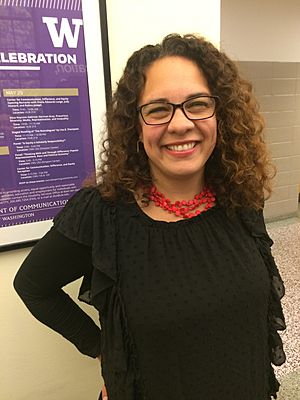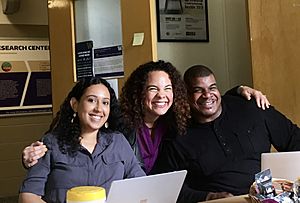Ralina Joseph facts for kids
Quick facts for kids
Ralina Joseph
|
|
|---|---|
 |
|
| Professor at University of Washington | |
| Associate Dean for Diversity and Student Affairs of the Graduate School at University of Washington | |
| Personal details | |
| Born | October 27, 1974 Washington, D.C., U.S. |
| Nationality | American |
| Residence | Seattle, Washington |
| Alma mater | Brown University University of California, San Diego |
| Website | https://www.ralinajoseph.net |
| Scientific career | |
| Institutions | |
| Doctoral advisor | Jane Rhodes |
Ralina Joseph (born October 27, 1974) is an American professor and researcher. She teaches at the University of Washington. Her work focuses on how different groups of people, especially Black women, are shown in movies, TV shows, and other media.
Contents
Her School Journey
Ralina Joseph went to Brown University for her first degree, a Bachelor of Arts (B.A.) in American Civilization. Later, she earned her Master of Arts (M.A.) and Ph.D. (a high-level research degree) in Ethnic Studies from the University of California, San Diego.
What Professor Joseph Does
Professor Joseph is a professor in the Department of Communication at the University of Washington. ..... In 2020, she became an associate dean for diversity and student affairs for the graduate school at UW.
She is also the director and co-founder of the Center for Communication, Difference, and Equity (CCDE). This center helps people understand how communication affects differences in society. For the 2019–2020 school year, she was a special fellow at the Northwest African American Museum.
Her Research Work
..... She often studies how famous Black women like Jennifer Beals, Tyra Banks, Oprah Winfrey, Shonda Rhimes, Serena Williams, and Michelle Obama are presented. Her work combines ideas from communication, cultural studies, and Black feminism.
Books by Ralina Joseph
Her first book, Transcending Blackness: From the New Millennium Mulatta to the Exceptional Multiracial (2012), explores how mixed-race Black people were shown in media before 2008.
Her 2018 book, Postracial Resistance: Black Women, Media, and the Uses of Strategic Ambiguity, examines how Black women deal with racism and sexism in a world that sometimes claims to be "post-racial" (meaning, beyond race issues).
Teaching and Programs
Dr. Joseph teaches classes like Communication Power and Difference and Black Cultural Studies. She created a program called Interrupting Privilege. This program helps people of all ages learn about differences and how to stop small acts of prejudice, called microaggressions. In 2017, this program won an award for its work in diversity.
Key Ideas from Her Work
Understanding Mixed-Race Identity
In her book Transcending Blackness, Joseph explores how mixed-race women are shown in media. She created terms like "new millennium mulatta" and "exceptional multiracial." These terms describe modern stereotypes of mixed-race individuals.
- The "New Millennium Mulatta" is often shown as angry, especially if she talks about race.
- The "Exceptional Multiracial" is seen as someone who has supposedly moved beyond race.
Joseph argues that these stereotypes prevent mixed-race Black women from showing their full, unique identities.
Strategic Ambiguity in Communication
In Postracial Resistance, Joseph talks about "strategic ambiguity." This is a way some Black women, like Kerry Washington, communicate in a subtle way. They use this method to deal with racism and sexism in a society that claims to be "post-racial."
Strategic ambiguity is a way to survive. It means speaking about power systems in coded ways, rather than directly pointing out racism or sexism.
Equity and Difference
Professor Joseph believes that "equity" (fairness) and "difference" (how people are unique) are connected. She thinks that understanding these ideas helps us work for a fairer world. Her Center for Communication, Difference, and Equity (CCDE) focuses on two main ideas:
- People understand differences through communication.
- Powerful groups, like universities, should use their power to support fairness.
She emphasizes how language shapes our understanding of race and inequality. The CCDE works with many different university departments and community groups. It creates a space to support those who face unfairness.
Joseph explains that we understand things by comparing them to others. This idea of "difference" helps us see how things are related, especially when it comes to power. She links this idea of difference with the practice of equity. She believes that making changes in classrooms and schools can lead to bigger changes in the world.
Awards and Recognitions
- The GO-MAP Faculty Leadership Award from the University of Washington (2013)
- Undergraduate Research Mentor Award from the University of Washington (2017)
- The Sapphire Distinguished Faculty Award from the Samuel E. Kelly Ethnic Cultural Center (2017)
- The Woman of Courage Award from the University of Washington Women's Center (2017)
- Presidential Term Professorship (Endowed Professorship) (2018)
- University of Washington Alumni Association Distinguished Service Award (2018)
See also
- List of University of Washington People


